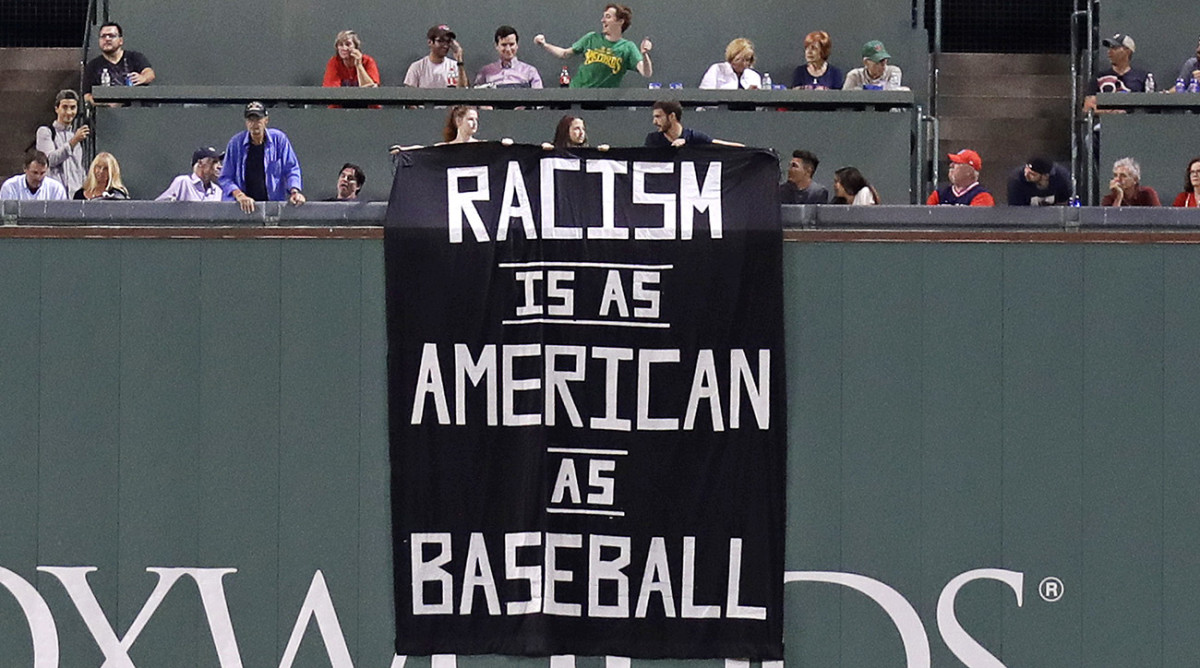Fenway Park a Fitting Site For ‘Racism’ Banner Protest in Turbulent 2017

A bold message displayed on the Green Monster interrupted the fourth inning of a sleepy A’s-Red Sox game Wednesday night. “RACISM IS AS AMERICAN AS BASEBALL,” declared the tall black-and-white banner unfurled by four fans, who were removed by security from the stadium immediately thereafter.
Images of the banner’s brief appearance have traveled far and wide online in the hours since, and some social-media types seem to be struggling to grasp its meaning. It was meant to call attention to the prevalence of racism in American society—not, of course, to endorse it—and to compel some blithe baseball fans to take stock of the world around them. Perhaps some of the confusion comes from the fact that some understand “American” to be a synonym for “good” or at least to have some sort of positive connotation baked in. It isn’t and it doesn’t to the people who unfurled that banner, and its meaning becomes entirely uncomplicated after accounting for that.
Clarifying matters further, one of the protesters talked to Evan Drellich of CSN New England and said, “We see Boston continually priding itself as a kind of liberal, not racist city, and are reminded also constantly that it’s actually an extremely segregated city. It has been for a long time, and that no white people can avoid the history of racism, essentially. So we did this banner as a gesture towards that, to have a conversation about that.”

If any ballpark in any year was cut out for such a protest, it would be Fenway in this turbulent 2017. In early May, Orioles outfielder Adam Jones, who is black, was subjected to racial slurs from spectators. A bag of peanuts was thrown at him. Jones called it one of the worst nights of his career; the Red Sox apologized publicly. (The protester who spoke to Drellich said the racism Jones experienced played a part in prompting the banner.) After Jones went public about his mistreatment, Yankees starter CC Sabathia said that he, too, had been called the n-word in Boston—and at no other stadium. “We know. There’s 62 of us. We all know. When you go to Boston, expect it,” Sabathia said.
Though the Red Sox currently have a number of black stars (Mookie Betts, David Price, Jackie Bradley Jr.) it’s relevant here that Boston was baseball’s last team to integrate. The Red Sox didn’t add a black player until 1959, owing to the racist policies of owner Tom Yawkey. (Jackie Robinson, who took part in a sham tryout for Yawkey to help the owner dodge charges that he was a racist, would later call him “one of the most bigoted guys in baseball.”) Current owner John Henry and team president Sam Kennedy have made a point of repudiating Yawkey’s legacy, and in August Henry called for the renaming of Yawkey Way, the busy street outside Fenway Park. Henry said he was “haunted” by Yawkey’s past.
If recent events in Charlottesville and elsewhere have sent any message throughout America, though, it’s that racism isn’t peculiar to Boston, Tom Yawkey or the 1940s and 50s. It’s a potent, present scourge—and that’s what the banner was reiterating.
